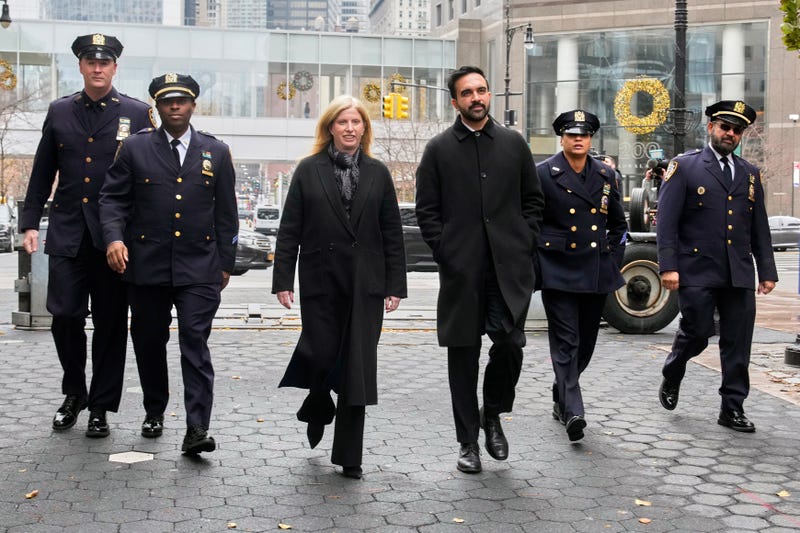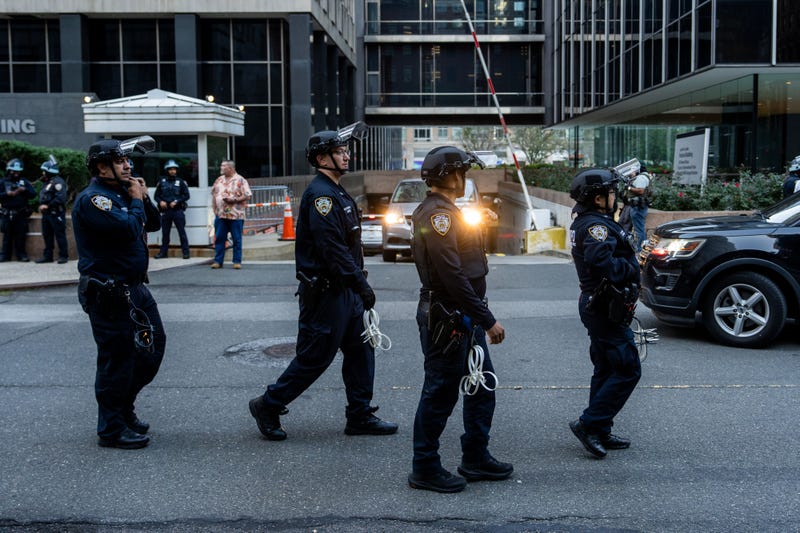
NEW YORK (BLOOMBERG) -- Rain slicked the granite at the New York City Police Memorial near the World Financial Center as Mayor-elect Zohran Mamdani stood beside Police Commissioner Jessica Tisch, speaking quietly with officers. It was the first public appearance since his election with the commissioner who will remain in charge of the 178-year-old police force.
“We share a commitment to keeping New York safe,” Mamdani said later on Wednesday. “Our disagreements are good. Too often, leaders surround themselves with people who just say yes. I want honest debate about how we make the city safer.”
Mamdani, 34, a democratic socialist who has pledged to overhaul the city’s approach to public safety, will take office as Tisch, 44, completes her first year leading a department once roiled by turnover. She’s credited with stabilizing the NYPD and restoring focus after years of attrition. Under her tenure, major crime has fallen across every category except rape, and shootings are at their lowest levels on record.
Their partnership is unlikely but pragmatic. Mamdani campaigned on keeping the police force at its current staffing level instead of expanding it as other candidates proposed. He promised to create a new Department of Community Safety to manage mental-health crises and homelessness outreach, tasks now handled by police officers. Tisch has emphasized data and technology to drive enforcement.
“Do the mayor-elect and I agree on everything? No we don’t,” Tisch said later at an event. “But in speaking with him it’s clear we share many of the same public safety goals for New York City: lowering crime, making communities safer, rooting out corruption and giving our officers the tools, the support and the resources they need.”
Mamdani’s plan calls for the new $1.1 billion agency to take on many noncriminal duties now handled by the NYPD. He has said the department’s 33,000-member force will remain intact but shouldn’t bear the burden of “every social failure.” Domestic-violence response would stay with the police.
“It’s untenable for officers to be asked to respond to 200,000 mental-health calls a year,” he said. “We need to ensure police can focus on policing.”

The proposal comes as the NYPD faces pressure to retain staff. More than 3,600 officers retired or resigned over the past year under Mayor Eric Adams, outpacing new recruits, according to the Police Pension Fund.
“Cops are quitting every day because they’re overworked and underpaid,” said Patrick Hendry, president of the Police Benevolent Association, the biggest police union. “We need to keep the cops we already have.”
What remains uncertain is how Mamdani, who is set to meet with President Donald Trump at the White House on Friday, will navigate the department’s ties to Washington. Federal funding accounts for only a small share of the NYPD’s budget — about 3.7% — but it supports counterterrorism patrols in the subways, radiation detection at ports and training for chemical and biological threats.
For Mamdani, the federal stakes go beyond budgets. Before he can be briefed on classified threats to the city, he must obtain a federal security clearance — a process controlled by the Trump administration, which has already revoked clearances for several Democratic officials, including Manhattan District Attorney Alvin Bragg and New York Attorney General Letitia James.
Strategic Response
One of Mamdani’s most disputed positions involves disbanding the Strategic Response Group, a roughly 600-officer unit that handles protests and emergencies. Critics say its aggressive tactics have eroded public trust. Former Police Commissioner Bill Bratton, who helped create the unit, called the mayor-elect’s plan “a significant morale risk.”
“If he takes those 600 officers and sends them back to precincts, you’re hurting some of your best performers,” he said.
Another point of contention is the NYPD’s overseas operations. Under Deputy Commissioner Rebecca Weiner, detectives are stationed in more than a dozen foreign capitals to gather intelligence after major incidents.
When Israel launched airstrikes on Doha, Qatar, in September, a detective in Tel Aviv called headquarters within minutes, linking counterterrorism officials with counterparts across the region. Weiner described it as “real-time reporting from the region,” coordination that allows the NYPD to act before federal agencies do.
On the campaign trail, Mamdani, a strong supporter of Palestinian causes, faced criticism over past comments he made about police force and its relationship with Israel, including saying in a 2023 video, “When the boot of the NYPD is on your neck, it’s been laced by the IDF,” referring to the Israeli army.
In an interview with CNN last month, he said the comments referred to training exercises between the NYPD and the Israeli military, calling such exchanges “of concern to me.” Asked whether he would maintain the liaison post in Tel Aviv, he said, “My focus is here on the NYPD office in New York City. That’s what I’ve been thinking about.”
Bratton called the liaison program “one of the NYPD’s most critical and admired counterterrorism tools,” warning that ending it “would alienate the business community and jeopardize information that keeps the city safe.”
More stories like this are available on bloomberg.com.
